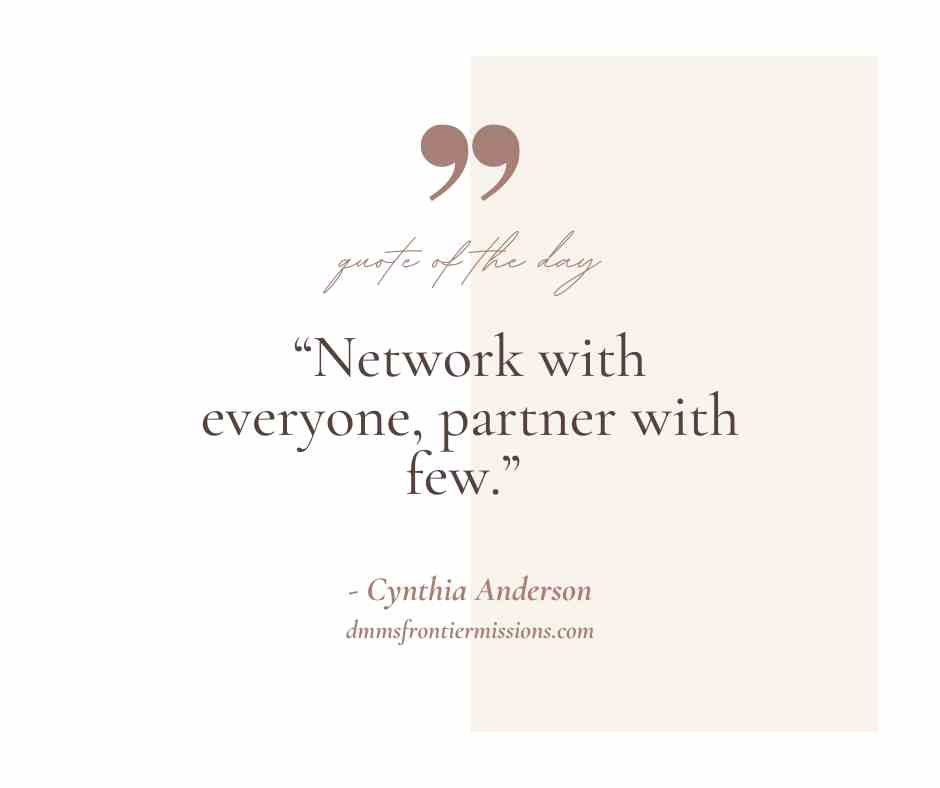Pioneering is tough. One can feel alone, overwhelmed, and under-resourced. Partnerships are sometimes a great solution to this sense of isolation. They may bring powerful solutions to the starkly felt gaps in the team or ministry. Or, they can cause even more problems. Some kinds of partnerships later become obstacles for those wanting to release a Disciple Making Movements (DMM) and multiply disciples and groups. Instead of helping, they slow or even stop the progress toward that noble aim.
I’ve been writing a series of blogs on DMM Obstacles. Check out some of the previous articles.
Barriers will certainly arise as you pursue the launching of a new movement. Some kinds of pitfalls are fairly easily avoided. Entering into unwise partnerships is one of them. Some basic guidelines and filtering questions can help greatly.
Network Boldly – Partner Cautiously
When coaching church planters in new places, this issue often comes up. My principle on partnerships is this- “Network with everyone, partner with few.” Not everyone is a good partner who will help you move forward toward your vision.

When Rushing Into Partnerships Caused Us Trouble
When working in India, we were often approached by people who wanted to become our partners. They heard about our vision for the unreached. They heard we had many national workers who spoke the local language. What they saw on our teams, impressed them.
Sometimes they were new to the area and looking for a way to get started. I’ve had countless meetings with potential partners over the years.
Rushing into partnerships always got me in trouble. At first, they seemed to understand what we were trying to do. Later, when the real issues related to multiplication surfaced, the relationships became difficult.
I learned to start slow and start small with those who want to partner. Even when it looks like it could be a powerful partnership that would greatly help.
“Do not be unequally yoked…” 2 Cor. 6:14 NIV
While this verse refers to marriage, the principle applies to any partnership. What does it mean to be “equally yoked” in working toward a multiplying movement or DMM? It means you share the same vision and strategy.
There is a big difference between networking and partnering.
Networking involves connecting, mutual learning, and developing a relationship. Partnership has to do with a commitment to one another and to working together for a clearly established purpose.
Be extremely cautious about becoming “unequally yoked” with someone who has a different strategy, different values, and a different vision. It could easily become an obstacle and unnecessarily drain off resources and energy needed for your primary task. It could initially provide things you need like money, friendship, or team members. Eventually, however, if you do not have shared values, strategy and vision, it is highly likely to cause major problems.
3 Questions to Ask When Committing to Partnerships
Below are three questions to ask before entering into a partnership, whether big or small.
1) Are they Kingdom-minded? Or interested in building a particular church or organization?
Is their vision for the multiplication of the Kingdom of God? Or the growth of their own organization or denomination?
Sad to say, not everyone is interested in building the Kingdom. Many want to build their own reputation, organization or church.
I could give many examples of organizations that routinely “buy” churches in unreached areas. If they require you as the ministry leader or church planter to attend their conferences, and all they give you is money… that is a RED FLAG! This will not likely be a helpful partnership in light of your goal to start a movement.
On the surface this is often not obvious. It is, however a common scenario. Caution is advised. Be sure you fully research the conditions attached to receiving their support and assistance.
2) Are they like-minded in vision, values, and strategy?
Carefully consider whether their vision, values, and strategy match your own.
- Do they understand your call to multiply generations of disciples and groups?
Many say they want that. In reality, they haven’t understood what it means.
Talk with them about:
- the priesthood of all believers
- simple church
- local believers leading the groups
- normal people baptizing others
- multiplication flowing through natural relationships
You might want to show them a generational chart and explain more about what a movement looks like and how they grow.
- Do they have any conflicting agenda that is a high priority for them?
You have to think carefully about partnering with groups that have their own agenda or vision. Maybe their goal is to distribute thousands of Christmas boxes to the poor. Or their vision might be to help refugees.
Network with those who have other goals, but avoid partnerships. It will only drain your resources and energy. You will spend much time in meetings and activities that don’t take you closer to your goal of multiplying disciples and groups.
3) Are they willing to pay the price of doing things differently from traditional churches in the area?
Many don’t understand there is a price to doing things in simple and reproducible ways. It is not monetary, but many times people do not understand you. Allowing ordinary believers to do the work of the ministry can cause resistance and even persecution from established churches. Will your partners stand with you when those things come up?
Find The Right Partner, Or Stay Single
I used to tell my daughters, “Don’t marry the first handsome guy that comes along. It is better to stay single than be unhappily married.”
The choice of whom to partner with, whether for life or ministry is serious. It is worth being careful and not jumping into things too fast. In many ways, as the old saying goes, its better to be safe than sorry. If you rush into something, you may end up spending much time and effort to remove yourself later. You also could become dependent on the resources provided and completely lose your focus and vision.
The partnership you’d hoped would help may, unfortunately, prevent the multiplication you are working to see released. Once again, network or collaborate freely but partner cautiously. Many partnerships can be a great help, but certainly not all of them.
What do you look for (or avoid) in a partnership? Do you have a story about a partnership that worked well? Please share in the comments below or on the Dmms Frontier Missions Facebook page.
1st Generation Skills

Get a free checklist of Skills needed for first generation disciples/trainees to move forward. Assess these skills and see faithful disciples turn into fruitful disciples.




Comments
Pingback: An Astonishing Movement Launches Through a Partnership – YWAM Frontier Missions
Madam iam very happy hear 50 days prayer God is great connect with you madam 50 days prayer God help more madam iam very happy hear india
Iam praying for you and your family and DDm ministry
Author
Thank you very much! God bless you.
Hello nice to hear from you,
Good ministry
Praise the lord can I also join in your mission
Author
You are welcome to join us as part of our community! The best way to do that is to take one of our online courses. You can find out more about them at courses.disciplemakersincrease.org
Am blessed
Kingdom minded is what we deserve as we disciples…
Thanks so much sorry I have been busy nursing my in law.
Pray for her.
Thank you so much but when you pray don’t forget to pray me
God to stand with me in ministry in Uganda
Prayers are the very important weapon so partnership should not harm the movement of DMM
Let we join Hands in prayers because we are one in Jesus Christ